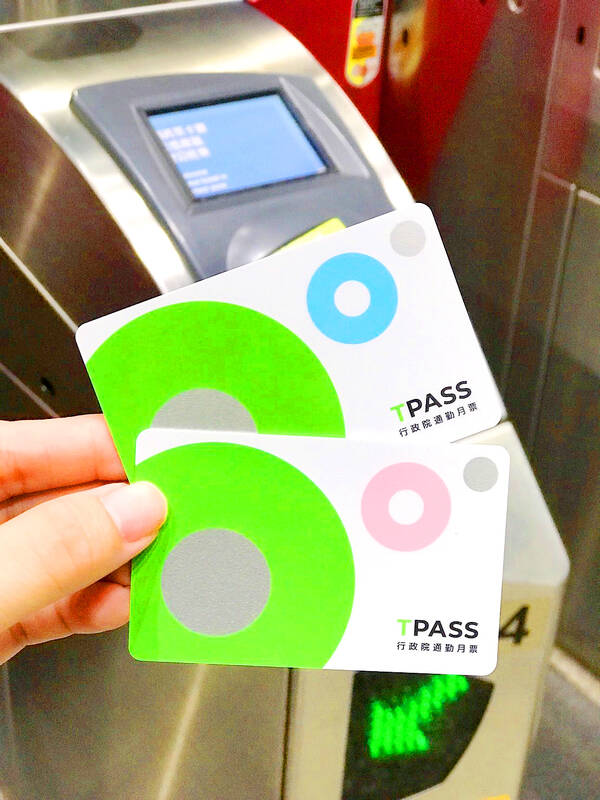The government is considering a TPass version that is valid for short periods, and versions designed for international tourists and domestic businesspeople, the Ministry of Transportation and Communications said yesterday.
The ministry unveiled the plan at a meeting of the legislature’s Transportation Committee, at which it briefed lawmakers on the results of the monthly TPass program since it began in July last year.
The ministry said in a report to the committee that it is considering TPass plans that are valid for 14 or fewer days, adding that the Highway Bureau is seeking input on the proposal and has a trial period planned at the end of this year.

Photo courtesy of Easycard Corp
The ministry said that it is seeking additional funding from the Executive Yuan to continue the TPass program after 2026.
Minister of Transportation and Communications Li Meng-yen (李孟諺) said that the ministry is considering issuing five-day or seven-day TPass plans, which would be convenient for international visitors and domestic business travelers.
Having more diverse plans helps expand the user base, Li said.
Democratic Progressive Party Legislator Hsu Chih-chieh (許智傑) said that people with a TPass 2.0 plan should be allowed to use it to access tourist attractions.
Li said that he would ask the Highway Bureau and the Tourism Administration to study the idea.
The monthly pass program was launched in metropolitan areas across Taiwan to make commuting more convenient and boost public transportation use, the report said.
Local governments in each metropolitan area can roll out tailored TPass plans and determine the transportation systems they encompass, it said.
The TPass available in Taipei, New Taipei City, Keelung and Taoyuan costs NT$1,200, allowing unlimited access for 30 days to the metro, light-rail, city bus, Taiwan Railway, highway bus, public bike and ferry systems, it said.
Nineteen administrative regions have rolled out TPasses, with 24 plans among them, the report said.
Penghu County is to launch its own TPass next month, it said.
Another TPass plan covering commutes between Taipei and Yilan County is to be launched in September, it added.
As of last month, 7.68 million plans had been sold, with 574 million uses, ministry data showed.
Regarding other matters, Li said that the government welcomes Chinese tourists after Chinese travel service operators scouted travel routes in Lienchiang County (Matsu).
About 150 Chinese tourism officials and industry representatives are expected at the Summer Travel Expo in Taipei, which opens tomorrow, the largest tourism delegation from across the Taiwan Strait since the COVID-19 pandemic.
“We are looking forward to having Chinese visitors in Matsu,” Li said. “We hope this would start soon.”
Taiwan is more open to cross-strait tourism than China, he said.
About 1.7 million Taiwanese traveled to China last year, but only about 200,000 Chinese traveled to Taiwan, he said.

Taiwan is projected to lose a working-age population of about 6.67 million people in two waves of retirement in the coming years, as the nation confronts accelerating demographic decline and a shortage of younger workers to take their place, the Ministry of the Interior said. Taiwan experienced its largest baby boom between 1958 and 1966, when the population grew by 3.78 million, followed by a second surge of 2.89 million between 1976 and 1982, ministry data showed. In 2023, the first of those baby boom generations — those born in the late 1950s and early 1960s — began to enter retirement, triggering

One of two tropical depressions that formed off Taiwan yesterday morning could turn into a moderate typhoon by the weekend, the Central Weather Administration (CWA) said yesterday. Tropical Depression No. 21 formed at 8am about 1,850km off the southeast coast, CWA forecaster Lee Meng-hsuan (李孟軒) said. The weather system is expected to move northwest as it builds momentum, possibly intensifying this weekend into a typhoon, which would be called Mitag, Lee said. The radius of the storm is expected to reach almost 200km, she said. It is forecast to approach the southeast of Taiwan on Monday next week and pass through the Bashi Channel

NO CHANGE: The TRA makes clear that the US does not consider the status of Taiwan to have been determined by WWII-era documents, a former AIT deputy director said The American Institute in Taiwan’s (AIT) comments that World War-II era documents do not determine Taiwan’s political status accurately conveyed the US’ stance, the US Department of State said. An AIT spokesperson on Saturday said that a Chinese official mischaracterized World War II-era documents as stating that Taiwan was ceded to the China. The remarks from the US’ de facto embassy in Taiwan drew criticism from the Ma Ying-jeou Foundation, whose director said the comments put Taiwan in danger. The Chinese-language United Daily News yesterday reported that a US State Department spokesperson confirmed the AIT’s position. They added that the US would continue to

The number of Chinese spouses applying for dependent residency as well as long-term residency in Taiwan has decreased, the Mainland Affairs Council said yesterday, adding that the reduction of Chinese spouses staying or living in Taiwan is only one facet reflecting the general decrease in the number of people willing to get married in Taiwan. The number of Chinese spouses applying for dependent residency last year was 7,123, down by 2,931, or 29.15 percent, from the previous year. The same census showed that the number of Chinese spouses applying for long-term residency and receiving approval last year stood at 2,973, down 1,520,